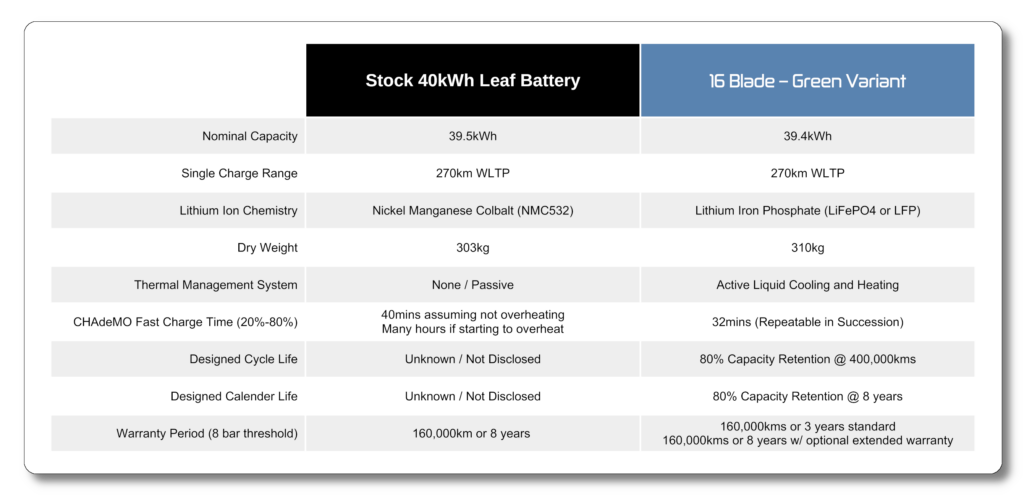|
|
|
Still no news about the 16-blade? No updates on their website evsenhanced.com and social media.
boland:Can't help but feel these guys have completely missed the boat with their 16 blade system. The price of upgrading from an older to a newer model Leaf has reduced in price over the past year or two that the idea of spending what was early estimated as "1/3 of the price of a new Leaf" on renovating an old one just doesn't stack up now.
Still no news about the 16-blade? No updates on their website evsenhanced.com and social media.
The ongoing reduction of new EV pricing hasn't helped the situation either.
https://www.harmlesssolutions.co.nz/
The longer they take before actually releasing it, the less-likely it is to happen. As others have said, the price of used EVs is coming down and upgrading a Leaf with an expensive system to try bring the battery up to modern standards is progressively more difficult to justify.
boland:
Still no news about the 16-blade? No updates on their website evsenhanced.com and social media.
the car will be worth less than the battery replacement will cost
Batman:
boland:
Still no news about the 16-blade? No updates on their website evsenhanced.com and social media.
the car will be worth less than the battery replacement will cost
Which is a real shame from a sustainability perspective. I would have considered it for ~NZ$15k for my 2016 30Kw Leaf. Some extra range and ensuring it goes for at least another 10-15 years. So driving for $1k+ a year or so. Practically there won't be much other expensive items requiring replacement over time other than tyres or brakes.
This means the only people who would do it are those who are environmental advocates (rather than those who are doing so for economic reasons) and those who are of means/willing to accept a potential financial loss for doing so. It probably decreases the customer base to the point that I'd question whether it's likely to happen at all.
Yeah I think they missed the boat. Related to this, what are currently the options for end of life Leaf batteries? I'm hoping to convert an EOL Leaf to home storage, I couldn't find companies that offer this service.
Even a 50% SOH 24kWh Leaf should be 12kWh usable, similar to a Tesla Powerwall.
I did find a couple of DIY posts, in most of them they take apart the battery to put them in parallel to get 48V (instead of the standard ~360V).
But then I ran across a video of someone who connected his Leaf battery directly as home storage, without taking it apart. It also has a very active Github repo. Still, I'm not an electrician, so I won't be able to do it myself, but I was wondering if anyone know how to get this done in NZ by a certified electrician?
From what I understand part of the picture so far as using Leafs in a V2G/V2H capacity is that the functionality enabling bidirectional charging (i.e. being able to draw down on the battery for external use) wasn't built into the very early ones. The Japanese government mandated this to be built into EVs as a result of the Fukushima disaster in order to provide electricity resilience in the case of grid outages and therefore MY2013 Leafs, and Outlander PHEVs, are capable of V2H due to this and their Chademo connections.
https://www.harmlesssolutions.co.nz/
I don't know if there is anyone offering a service to install a home battery based on Leaf cells - DIY generally sees them reconfigured into 48V as stated because that's how inverters expect to operate in order to convert to AC for home use.
boland:
Still no news about the 16-blade? No updates on their website evsenhanced.com and social media.
It's an incredibly ambitious project they have taken on, both technically and financially
From a technical perspective, building a from scratch pack, and fitting it in the stock case, and getting it to interface as per a stock battery with a car must be mightly challenging.
Using a less energy-dense battery chemistry, and adding liquid cooling for just a 7kg (dry) weight gain would also be challenging to acheve.
But the biggest challenges are economic.
Globally EV production has been constrained by battery production (this may be changing as we have moved from a global shortage of cars, to a small glut, especially impacting EV's). This means automakers (with far more market power than enhanced) would have been buying up pritty much every automotive grade pack they can get their hands on, making it hard to secure automotive grade cells.
Also every battery pack that gets sold in a new car picks up subsidies (i.e. our clean car discount), or is able to offset fees (i.e. our clean car standard), worth thousands. Many developed continues have similar policies. Sadly a replacement pack to give new life to an old EV doesn't get these subsidies. Making a new pack relatively more expensive when purchased alone.
On cost EV enhanced say: "However, for a finished 16 Blade GREEN pack, we are NOT aiming to undercut the retail price of US$11,225 that Nissan USA charges for a new, but inferior 40kWh battery. Our focus from the outset has been on making a superior product with a better design leading to improved performance and a longer life-cycle."
Convert to NZD and add GST, and the packs will cost more than $21,240. Given EV enhanced charge $22k to swap a 40kWh pack they likely sourced from a crashed car into a 24kWH, 55% health leaf, it is likely to be a lot more than this for a brand new, from scratch pack with active cooling. But lets move on with $21k anyway.
Let's say one has a donor car was a 5 bar 2013 (currently listed for $3800 on facebook marketplace, so lets assume a market value of $3k).
We are now at $24k. Which can buy a 2018 40kWh (89%SOH) leaf with all it's advantages (more powerfull motor, bigger boot, better styling, Android auto, Propilot etc.
https://www.trademe.co.nz/a/motors/cars/nissan/leaf/listing/4415751714
And you are only about $15k away (with current clean car rebate) from a brand new a base MG4, with 7 year unlimited KM, substantially more WLTP range (270km vs 350km), faster fast charging, CCS2 port, tow rating, RWD, even more powerfull motor etc.
And with either of those routes, you don't need to bother explaining to your insurance company and prospective buyers, that your $3k car has a battery upgrade which adds $21k to it's value.
Should also note that 40kWh packs seem to be holding up better than 24kWh & 30kWh packs (clear concave up trend per flip the fleet data). So it appears unlikely that they would need a pack upgrade in next 5 years or so. So leaf pack upgrades would need to serve 24 & 30kWh primarily.
Of course, this all sucks environmentally.
But on the other hand, it is great that EV Enhanced have worked out how to swap packs between various leaf bodies. Which means that any time with a decent battery gets written off through a crash, the battery pack is likely to be used to upgrade a leaf with a poor battery pack.
Great summary there 👍
I'm one of those in the boat of having a 2013 Leaf with a crapp SOH that barely supports my commute. I might consider a replacement option up to...I dunno....maybe $10k? Beyond that, as said above, I'd rather bite the bullet and buy another car. I can't fund fixing the planet on my own.
Even buying a 70-80% SOH swap from a wreck is probably not really economic anymore.
I would have considered it if it came with a decent credit for an OK-ish 40kwh pack for my ZE1 just to drag out the life of my car.
I check in every few months for updates and haven't seen anything in a while.
Does anyone have any tips for cleaning the bionicle glass behind the steering wheel? I know it scratches super easily but I haven't cleaned mine since I imported it and it's getting to a crisis point.
I'm slowly putting together a parts inventory of stuff I will replace before I sell it - I already have a brand new head-unit but I'm thinking I'll probably need to replace the dash lens (if that's possible).
|
|
|
